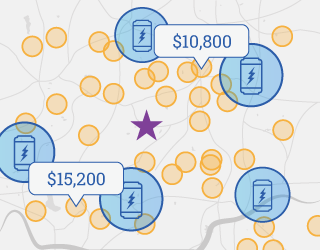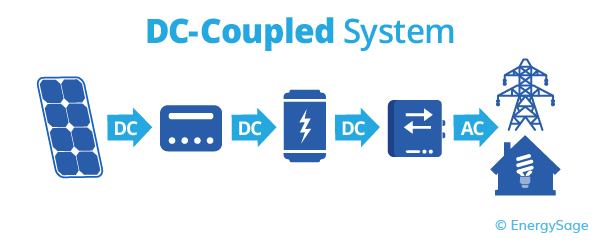Solar batteries are becoming popular additions to solar energy projects of all scales. When it comes to the way your solar panels, batteries, and inverters are all wired together on your property, there are two main options: alternating current (AC) coupling and direct current (DC) coupling. Both AC and DC coupling have advantages and drawbacks that are dependent on the specifics of your solar plus storage installation.
AC vs. DC coupling: what’s the difference?
The key distinction between an AC-coupled and DC-coupled system lies in the path electricity takes once it is produced by solar panels. Solar panels generate DC electricity that must be transformed into AC electricity for your home’s appliances. However, solar batteries store electricity in DC form.
In an AC-coupled system, DC solar electricity flows from solar panels to a solar inverter that transforms the electricity into AC electricity. That AC electricity can then flow to your home appliances, or go to another inverter that transforms the electricity back to DC for storing in a battery system. With AC-coupled systems, any electricity that is stored in the battery system needs to be inverted three separate times before use.
In a DC-coupled system, DC solar electricity flows from solar panels to a charge controller that directly feeds into a battery system, meaning there is no inversion of solar electricity from DC to AC and back again before the electricity is stored in the battery. Any electricity produced by the solar panels will be inverted only once (from DC to AC), either as it flows from batteries to your home electrical setup or out to the electrical grid.
Historically, AC-coupled battery storage setups have been more common for residential and commercial solar installations, but as more DC options become available, DC coupling is gaining in popularity.
Pros and cons of AC coupling
The main advantage of AC-coupled solar battery systems is their ease of installation, especially for retrofit storage installations. Easier installations require less labor and time for solar installers, which often means a lower upfront cost.
An additional benefit of AC-coupled systems is that these setups allow batteries to charge from both solar panels and the grid. This means if your solar panel system isn’t generating enough electricity to fully charge your battery, you can still rely on the grid to fuel your battery for resiliency or electricity rate arbitrage benefits. This is also an important advantage if you’re hoping to participate in a utility energy storage pilot or another type of demand response program, as your electric utility may need to be able to control the flow of electricity in and out of the battery.
As far as drawbacks are concerned, AC coupling means that stored solar electricity will need to be inverted three separate times before being used by home appliances. The process of inverting electricity from AC to DC, or from DC to AC, results in small efficiency losses, so the more inversions that take place, the larger the overall reduction in system efficiency. Most inverters have efficiency losses of about a few percentage points.
Pros and cons of DC coupling
DC-coupled solar energy systems have the advantage of being more efficient than AC-coupled systems. While solar electricity is converted between AC and DC three separate times in an AC-coupled storage setup, DC systems convert electricity from solar panels only once, leading to overall higher system efficiency.
That being said, DC-coupled options are more complicated to install, which can drive up upfront costs and installation time.
Which solar plus storage system is best for you?
If you already have a solar panel system installed on your property and are looking to add battery storage as a retrofit, an AC-coupled system is likely best for you. This is because you’ll already have a solar inverter system installed with your panels, and rewiring for a DC-coupled system is a complicated process that can increase installation costs.
That said, if you’re installing a solar panel system and battery setup at the same time, a DC-coupled system may be the better option because of the higher overall efficiency of DC-coupled setups. However, the installation time for DC-coupled systems is usually longer than for AC systems, so it’s important to factor in how that will impact your upfront installation costs.
See if solar plus storage is right for you
Regardless of whether you choose an AC or DC coupled system, installing a solar plus storage system on your property can be a great way to save money. Check out EnergySage’s Solar Calculator to see how much solar alone can save you, and register for the EnergySage Marketplace to receive quotes for solar (and solar plus storage) from local solar companies licensed to install these systems.








